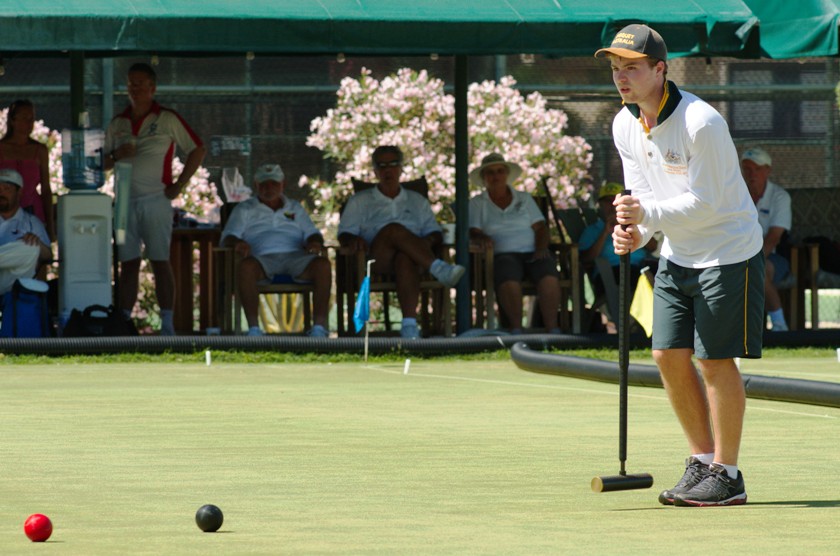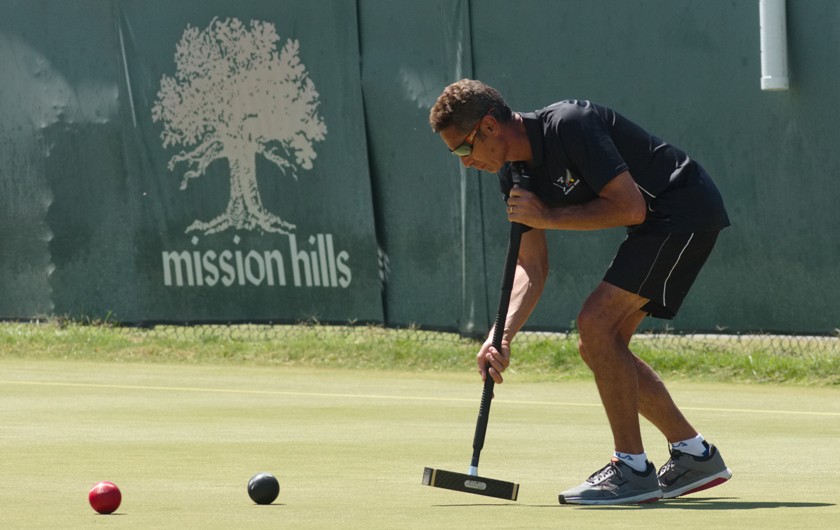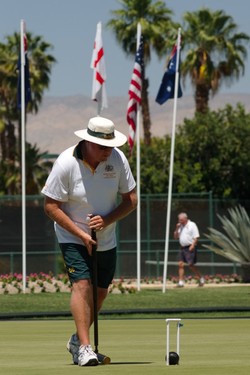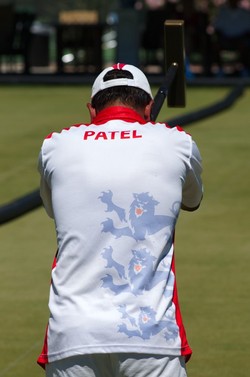Clarke: Bamford and Chapman for the Title #09
Soo: Block H Entertains at Kelburn #05
Clarke: Plenty of Upsets on Day One #02
Soo 18: 2017 Mac Wrap Up
 All that history, and now our names too -- Malcolm and Greg Fletcher with the MacRobertson Shield. Click to Zoom.
All that history, and now our names too -- Malcolm and Greg Fletcher with the MacRobertson Shield. Click to Zoom.
On the final day of the 2017 MacRobertson Shield, England and Australia extended their leads. Two singles matches were left unplayed, due to the extreme heat (officially 105/40, but probably hotter on the lawns) and the fact that both tests had been decided the day before. The final tally:
1. Australia (3/3 test matches, 40/63 individual matches)
2. England (2/3 test matches, 38/61 individual matches)
3. New Zealand (1/3 test matches, 22/61 individual matches)
4. United States (0/3 test matches, 24/63 individual matches)
Australia's victory is notable in many ways. It is their first series win since 1935, and their first outside Australia. It is the first time since 1935 that the England or Great Britain team has been beaten twice in a row, the first time three siblings have played in the event, and the first time that the defending champions have finished lower than 2nd.
ROUND THREE PHOTO GALLERY
What lessons can the other teams draw from Australia's performance?
It's good to have the world's #1 player on your team. An obvious point, but beyond assuring a healthy number of wins at the top position, this engenders a lot of confidence for the rest of the team.Strength in depth is critical. The top performer for the series on percentage of matches won was Greg Fletcher, playing at #5 and winning 5/6 singles and 7/9 doubles with Simon Hockey. Every team has at least one player ranked in the world top ten; it's at the bottom of the order that the differences are most pronounced. A team that can legitimately put very strong players at #5 and #6 has a huge advantage.
Team unity and discipline play a role. During Great Britain's streak of seven successive MacRobertson Shield championships, their team-of-rivals style worked well enough, because of their overwhelming advantage in playing strength for most of that period. In a more competitive series, Australia (and New Zealand in 2014) have shown the value of a unified approach. This applies to on-court matters such as tactics and doubles compatibility, as well as logistical arrangements for travel, housing, etc. An effective team manager is a big help.
Clarke: 2017 MacRobertson Review - Round 3
Third Tests Review
It would be all too easy to write about the hoard of errors that we have seen over the past five days. To do so would completely fail to acknowledge the extreme temperatures that the players have had to endure. I would certainly not have been playing at multiple junctures, with temperatures reaching 106 F. The pull on the balls had increased noticeably, with some players commenting that the black has been too hot to pick up.
Therefore, I will just comment on a few of the high quality matches that have still occurred. Jamie Burch played well to beat Paddy Chapman, Aiken Hakes played well to beat David Maugham who also played well back and Robert Fletcher played well against Ben Rothman.
England comfortably beat NZ 15-4, although the match should have been tied 3-3 after day 2. Australia played solid croquet to achieve the basic Mac pattern of winning each day 2-1, 4-2, 2-1, 4-2, 2-1. The USA were competitive throughout.
The event lacked several things and one thing.
- Finishing – so many basic finishing turns failed to finish.
- Understanding – there was a lack of understanding of how to make lift leaves, play pegged out endings, optimise non-lift leaves and optimise openings.
- Leaves – so many games featured leaves giving away 9 yarders, or doubles.
- Firm hoops – it was too easy to run hoops gently from distance and angle.
- Originality – there was a lack of popping combined with hoop leaves.
- Reliability – very few players were able to produce a consistent performance level.
- Desire – from the English to turn up fully prepared to play the Australians in the first Test.
Below is an overview of each team followed by my thoughts on the individual players. Whilst we were over here, we had the NFL Draft after which some reporters gave a grade to each of the 32 teams. I have tried to do the same with the players, considering how they performed compared to expectations. Grades run from A+ to E-. The fact that I have given no-one a low grade is an indication that there were no walkover “guaranteed” wins this Mac. All players can leave with a degree of satisfaction.
USA
This was a good performance from Team USA. They were constantly competitive and picked up a large number of wins. I disliked their response R 9 yards E of the peg in response to supershots (particularly long ones) and this opening was unsuccessful most of the time. Overall, their breaks were scrappy and their leaves left a lot to be desired. They started well in all Test matches but looked much more nervy as the winning line became closer.
New Zealand
This was a team that only knew its true identity a couple of weeks before the event. For them to mount a comeback from 4-7 against the USA was a massive achievement. They got into every Test, but at times it appeared that they were researching for a new book called “101 ways to put down winning turns.” They could easily have picked up another 9 or 10 match wins. They will view this year as a transitional one and look forward to introducing their exciting young prospects into the next Mac and hopefully welcoming back a couple of their strong experienced players.
England
Started poorly and improved slightly. There were some good performances capable of winning the event, but too many mistakes combined with poor tactical decisions cost them. Clearly playing the strongest opposition in week 1, when out of season, was an additional handicap. The fact that they were playing a different game to the one normally played in England cannot have helped them. In 2006, GB destroyed their opposition, reaching 11-0 in the final before cruising to a big win. In the 11 years since, England/GB have failed to win the most matches in any MacRobertson Shield and have lost two Solomon Trophies. They seemed unaware that TPOs and sextuples were bad tactics. I have written for many years that England turn up to these major events unprepared with untried doubles pairings. This year it cost them.
Australia
Almost the opposite to the England team. 30 months of preparation combined with a clear tactical game plan and good doubles pairings set the solid base for a good all round team performance. I’m not sure that they pegged anyone out at all before the last day. They have a youthful team that could go on from here and will no doubt have great support when they defend their title in Australia in 2021. Worthy winners.
Player Analysis
Robert Fletcher: Grade A-
When you come into a MacRobertson Shield graded 200 points higher than the next player, it is tricky to meet the expectations that everyone has of you. Robert made close to zero errors having made the first hoop of his turn, but did fail hoop 1 on a few occasions. His shooting was mixed and the easy lawns meant that he suffered more defeats than he would have liked.
Simon Hockey: Grade B
Probably the least consistent of the Australian contingent. Simon often looked classy when on a tp, but his shooting and leave making often fell below expectations.
Ian Dumergue: Grade B
Got his team off to a good start in the first test before weakening in later Tests. Variable shooting ranging from good at long range to suspect at short range. Lovely positive character – excellent captain.
Malcolm Fletcher: Grade B+
Error prone towards the start of the event, but improved as he settled. Breakplay still far too loose for my liking, but enjoyed the easy playing conditions that allowed recoveries from previous misplay.
Greg Fletcher: Grade A+
Probably the best shot in the event, clearly having benefited from playing in the GC Worlds. Whilst he did make quite a few errors, I have felt forced to give him an A+ due to his ability to win openings, regain the innings and complete triples when playing on his debut.
Stephen Forster: Grade B
Once in the balls, Stephen always looked graceful and possessed some of the best touch of any of the players. The first shot of his turn was highly suspect, with him having recently changed to centre style Solomon for these shots.
David Maugham: Grade A
Very few errors combined with quality leaves made this a strong performance. In terms of the future, his ever diminishing backswing must cause concern.
Jamie Burch: Grade A-
Shot very well as always. Still too loose a break player for my liking, but improving. Nice speed of play.
Samir Patel: Grade B+
A little too inconsistent to quite gain an A- grade. Played plenty of good turns but slightly too many poor ones. More likely to take good tactical lines of play than some of the other English players.
Stephen Mulliner: Grade C+
Attempts at a sextuple and many failed tpos and losing tpos made this a disappointing event for the World Champion. Finished his dead match with an entertaining sextuple that had a straight quadruple with half-jumps at 4-b and rover.
James Death: Grade C-
Fun to watch as ever, but surprisingly making a lot of breakplay errors and compounding that with long periods of poor shooting.
James Hopgood: Grade B+
A mixed bag from the debutant. Plenty of high quality turns were mixed with some dreadful games.
Paddy Chapman: Grade A-
Probably my favourite player to watch. He was elegant, played controlled turns and attempted more popping than any other player. Not quite on top form and always slightly vulnerable against the best shots.
Aiken Hakes: Grade A-
The only unbeaten player in singles with several excellent matches. Doubles disappointingly less effective or cohesive. An impressive debut.
Joe Hogan: Grade C+
Great to have the first ever World Champion back in the Mac. He played several good turns and regularly hit his last shot to generate game winning turns. Regrettably, most did not finish. Shots such as irish peels and peg outs really showed the difficulty of using a basic 9” unweighted mallet.
Jenny Clarke: Grade B
The best performance level I have ever seen from a player who won such a low percentage of games. Plenty of third turn balls round and good leaves always seemed to be followed by her opponent hitting and finishing in two turns. Spoke well at the functions.
Chris Shilling: Grade A
Had one of the best combinations of controlled hoop stroke and croquet strokes in the event. Fabulous debut. Would have got an A+ if he had taken one of his finishing turns to make it 3-3 vs England on day 12.
Harps Tahurangi: Grade C+
Starting mid-series is a tough ask and Harps was always competitive. Great tp to win his first match on day 12, but too many easy breaks put down overall.
Toby Garrison: Grade B-
Tough ask to come and play at number 2 in a Mac having not played for some time. Improved day by day and was a fabulous team member.
Ben Rothman: Grade B-
Playing at the club where he used to be pro, I expected a strong performance from the British Open Champion. However loose break play cost him matches he should have won. Seemed unhappy with the hoops, complaining that they should be wider.
David Maloof: Grade B-
Loose break play once again caused some unforced errors that proved costly playing at number 2.
Danny Huneycutt: Grade C+
Perhaps the most Jekyll and Hyde performance of all. He interspersed solid triples that showed his underlying ability level with a jerky set of single ball strokes that indicated he was battling with the yips.
Jeff Soo: Grade B-
Once again playing too high in the team order for my liking, he played plenty of solid turns. However, a tendency to slam at key hoops caused his undoing on multiple occasions.
Stuart Lawrence: Grade B+
Good debut. Played some good peeling turns, but combined that with some games that degenerated rapidly in quality.
Stephen Morgan: Grade B
Good debut. Still lacking the controlled breakplay that he will need when playing in trickier conditions. Always looked solid at longer hoops. Needs to develop greater control and improve his leaves.
Matthew Essick: Grade B+
The ultimate in uncontrolled croquet. Five and six yarders regarded as normal. It is a style of play that I struggle to appreciate, but it did work in some of his matches.
Soo 17: AUSSIE AUSSIE AUSSIE!
 Malcolm Fletcher plays the Shield-winning turn
Malcolm Fletcher plays the Shield-winning turn
Australia wins the MacRobertson Shield
On the hottest day of the tournament, the Aussies felt right at home. Fittingly, it was the three Fletcher brothers who gave their team the 9th, 10th, and 11th points to win the final test match against USA, and to claim the MacRobertson Shield. Simon Hockey added another point to make it 12-6, with a final round of doubles to be played tomorrow.
World #1 player Robert Fletcher got the first point of the day, with a +25tp, +8tp win over USA #1 (and, as of the start of the match, world #4) Ben Rothman. Greg Fletcher put his team "on the hill" with a +26tp, +17tp win over USA's Stephen Morgan. Stuart Lawrence (USA) kept his team's hopes alive with a +2, -26tp, +17tp win over Stephen Forster (AUS). Jeff Soo (USA) beat Aussie captain Ian Dumergue +24tp, +15 to make it 10-6.
In the late-starting matches, Malcolm Fletcher won the first against USA captain Danny Huneycutt, +24tp. Simon Hockey won the first against David Maloof (USA) +10. Fletcher had a chance for a standard triple in game 2, but it became more and more delayed and ended with one peel done and an OSL. Huneycutt missed the short shot. There were not many easy shots in Fletcher's winning turn, but he held his nerve and pegged out to win game, match, test match and championship. Hockey joined his teammates for an emotional celebration, before returning to finish his match with Maloof.
England swept the doubles round against NZ to take an unassailable 12-3 test-match lead. Currently trailing Australia by 3 individual matches won, they have a chance to overtake Australia on that statistic in tomorrow's final round.
Soo 16: Australia is Three Wins Away
With another winning day, Australia is in good position to secure the Shield a day early. USA must win tomorrow's singles by at least 4-2 to keep the test alive on the final day. Winning two out of three of today's doubles matches, Australia now leads the test 8-4.
 England's Jamie Burch peels rover in game 1 against NZ's Paddy Chapman7-5 seemed a likely result at a couple of points. David Maloof & Ben Rothman (USA) won their match against Robert & Malcolm Fletcher (AUS) +21tp, +17tp, Rothman doing both triples, bringing the test match to 4-6. Stuart Lawrence & Jeff Soo (USA) won the first against Simon Hockey & Greg Fletcher (AUS), the Aussie pair not taking croquet as Lawrence tripled for +26tp. Break up in the second, Soo missed a rush, allowing the Aussies to level, +17tp (Hockey tripling). As the temperatures climbed, so did the error rate. The American's achieved peg and 4-back with a classic "tea-lady" leave, the Aussies on 4 and 2-back. Fletcher hit the 35-yarder and went to peg with a tidy spread. Lawrence missed and Hockey finished +5.
England's Jamie Burch peels rover in game 1 against NZ's Paddy Chapman7-5 seemed a likely result at a couple of points. David Maloof & Ben Rothman (USA) won their match against Robert & Malcolm Fletcher (AUS) +21tp, +17tp, Rothman doing both triples, bringing the test match to 4-6. Stuart Lawrence & Jeff Soo (USA) won the first against Simon Hockey & Greg Fletcher (AUS), the Aussie pair not taking croquet as Lawrence tripled for +26tp. Break up in the second, Soo missed a rush, allowing the Aussies to level, +17tp (Hockey tripling). As the temperatures climbed, so did the error rate. The American's achieved peg and 4-back with a classic "tea-lady" leave, the Aussies on 4 and 2-back. Fletcher hit the 35-yarder and went to peg with a tidy spread. Lawrence missed and Hockey finished +5.
Stephen Forster & Ian Dumergue (AUS) went game-up against Danny Huneycutt & Stephen Morgan (USA), +21. Huneycutt had an early break in game 2, but failed hoop 3, and the Aussies kept control for +24.
The ENG vs NZ singles featured a back-to-the-future match: Joe Hogan (NZ) vs. Stephen Mulliner (ENG). The pair's last MacRobertson Shield singles match was in 1990, a year after Hogan became the inaugural WCF AC world champion. This time Mulliner is the current AC world champion. Mulliner won the first +26tp, and TPO'd Hogan's ball in game 2. But Hogan won +5otp to force the decider. Hogan had a triple peel in good order in game 3. Until he missed the peg-out from four yards, sending the forward ball off the lawn. Mulliner had two breaks to finish, +2tp.
Earlier, Aiken Hakes (NZ) continued his winning ways in singles, beating David Maugham (ENG) -23, +17tp, +17tp. James Hopgood added a point for England, beating Chris Shilling (NZ) +26tp, +5tp. Likewise for James Death (ENG), winner against Harps Tahurangi (NZ), and Jamie Burch (ENG), +20tp, +26tp over Paddy Chapman (NZ).
England captain Samir Patel made it 9-3 for his team, beating NZ captain Jenny Clarke 2-0.
Soo 15: Temperatures and Play Heat Up
 Harps Tahurangi approaches 3-back on his match-winning turn
Harps Tahurangi approaches 3-back on his match-winning turn
Today's high reached 98/37, with triple digits expected later in the week. The lawns are now running around 13 seconds in the morning and about half a second faster later in the day. At this speed, hoop hills and the occasional sloping boundary become bigger factors.
Three of today's 8:30 singles matches featured a Fletcher. All three went to three games. Each Fletcher tripled twice to add three points to Australia's total.
But first, USA captain Danny Huneycutt took advantage of errors by Australia captain Ian Dumergue to win game 1 by +23. Attempting a straight-double finish in game 2, an errant escape ball at rover resulted in two clips and four balls at rover. Dumergue failed 1, then missed after Huneycutt scored rover with one ball and made a leave; +26 to tie the test match at 2-all.
David Maloof (USA) got off to a great start against world #1 Robert Fletcher (AUS), +26tp. Fletcher reversed the score in game 2. Fletcher went round turn 3 in the decider, to a defensive spread. Maloof hit in, made a couple of hoops, then retired with a leave. Fletcher hit with his forward ball, Maloof missed, and Fletcher closed out the match +24tp, putting Australia in the lead again.
Jeff Soo (USA) won a back-and-forth game 1 against Malcolm Fletcher (AUS), +17tp. Soo failed a third-turn break in game 2, Fletcher leveling +24tp (despite rushing dead into the peg three times during his finishing turn, twice while rushing to a hoop). Soo went break-up in the decider, but ran afoul of the treacherous lawn 1 east boundary on his second break. Fletcher went round to an MSL, Soo missed, and Fletcher played an elegant triple peel for +14tp.
 Simon Hockey peelingStuart Lawrence (USA) put out a supershot ball against Greg Fletcher (AUS), missing Fletcher's max-distance reply into IV. That ball stayed in IV for quite a while, Fletcher hitting fourth turn and content with three balls for most of the turn. Lawrence missed and Fletcher finished +26tp. Lawrence equalized, +17. As with the first two games, the decider opened with a supershot ball and no roquet on turn 3. Lawrence went break-up. Fletcher hit in and went round to an NSL. Lawrence missed and Fletcher finished +17tp.
Simon Hockey peelingStuart Lawrence (USA) put out a supershot ball against Greg Fletcher (AUS), missing Fletcher's max-distance reply into IV. That ball stayed in IV for quite a while, Fletcher hitting fourth turn and content with three balls for most of the turn. Lawrence missed and Fletcher finished +26tp. Lawrence equalized, +17. As with the first two games, the decider opened with a supershot ball and no roquet on turn 3. Lawrence went break-up. Fletcher hit in and went round to an NSL. Lawrence missed and Fletcher finished +17tp.
Stephen Forster (AUS) and Stephen Morgan (USA) were the first late-starting match. Forster won a scrappy game 1 +19, then tripled for +17tp and the match win.
Simon Hockey went round third turn to the aggressive ("three ducks") spread. Rothman missed, but Hockey crashed at 6 with one peel done. Rothman peeled Hockey's back ball through 6, but loose play toward the end of the break led to a missed roquet and easy pickup for Hockey, +17. Quite a few errors in game 2, Rothman equalizing with +14tp. Hockey won the opening in the decider, but failed to get going with a second break. Rothman went round to a spread and Hockey missed the long shot. For the second day in a row, Rothman finished a match in the early evening to stop the bleeding for USA; the test match now stands at 6-3 to Australia.
In the ENG vs NZ doubles, Paddy Chapman & Aiken Hakes (NZ) kept James Hopgood & David Maugham (ENG) seated, Hakes going round on turn 3 in game 1 and turn 4 in game 2, Chapman tripling (straight-double finish each time) +26tp, +26tp, to put NZ on the board.
Jenny Clarke & Harps Tahurangi (NZ) won game 1 +26 against Stephen Mulliner & Samir Patel (ENG), no croquet for the opponents. Clarke went round 3rd turn in game 2, making the aggressive spread. Mulliner hit and peeled Clarke's ball out of the game; Patel finished +13tpo a few turns later. A Mulliner error gave Clarke the first clean break of game 3. Patel missed the lift. Tahurangi needed two turns to get going, but put together a gritty delayed triple peel, including a straight-double finish, for his first match win of the series and bringing NZ to 2-3 for the test match.
Jamie Burch & James Death (ENG) were quick +26tp winners of game 1 against Chris Shilling & Joe Hogan, Death tripling. Shilling had the first clean break of game 2. Burch hit and went round; Hogan hit. His triple-peel attempt came undone at 4-back, two peels done. But that was not the last error of the game, NZ holding on for +11. Plenty of long shots hit and opportunities missed in the decider, England winning +3 to retain the test-match lead after two days of play, 4-2.
Soo 14: AUS Leads 2-1 in R3 vs US
 England captain Samir Patel launches a lift shotRobert & Malcolm Fletcher got Australia on the board quickly against USA, beating Stuart Lawrence & Jeff Soo +17tp, +26tp, Malcolm doing both triples. The Americans had a couple of extra chances to hit in, Robert needing two turns to get going in each game, but both shots missed. Lawrence hit the lift in game 1 and went round, but Malcolm hit the lift to finish.
England captain Samir Patel launches a lift shotRobert & Malcolm Fletcher got Australia on the board quickly against USA, beating Stuart Lawrence & Jeff Soo +17tp, +26tp, Malcolm doing both triples. The Americans had a couple of extra chances to hit in, Robert needing two turns to get going in each game, but both shots missed. Lawrence hit the lift in game 1 and went round, but Malcolm hit the lift to finish.
Danny Huneycutt & Stephen Morgan (USA) took advantage of game 1 errors against Simon Hockey & Greg Fletcher (AUS), Huneycutt tripling for +24tp. A failure at hoop 6 gave the Aussies control of game 2; they won +21 to level the match. In game 3 a wrong ball error was the Americans' undoing, Hockey tripling to close out the match and give Australia a 2-0 start to the test.
David Maloof & Ben Rothman (USA) split a scrappy pair of games with Ian Dumergue & Stephen Forster (AUS), winning the first +14 and losing the second -5. No croquet for the Aussies in game 3, making the test match score 2-1 to Australia.
Paddy Chapman & Aiken Hakes (NZ), went game up against Samir Patel & Stephen Mulliner (ENG), Hakes tripling for +15tp. The English pair leveled, +17. In the decider, Patel failed 3-back to give Hakes a break, but Mulliner hit the the lift and finished with an adventuresome quadruple peel.
James Hopgood & David Maugham (ENG) won the first game against Chris Shilling & Joe Hogan (NZ), Hopgood hitting the lift and tripling, +15. In game 2 Maugham TPO'd Shilling out of the game, both backward clips on hoop 2, leaving balls in corners III and IV. Hogan rolled out from IV, but missed the ball in III. Several turns later Hopgood made a two-ball break from 4 through 3-back, and rushed to within a few yards of Hogan's ball south of III. But he failed to get a rush, then failed to get position, and retired to IV. Hogan made 2 and 3, rolled out from IV, then soon had a solid 3-ball break going. But a deep pioneer at 2-back ended that break. Maugham made a leave, Hogan cornered, and Hopgood finished with another two-ball break.
Jenny Clarke & Harps Tahurangi (NZ) won the middle game against Jamie Burch & James Death (ENG). But a pair of Death triples in the outer games made it a clean sweep for England.
